Taiwan Votes 2024: Longer military conscription sees rare consensus by presidential hopefuls, but youth concerns remain
Taiwanese male youth tell CNA they view military service as a duty rather than an achievement, while former conscripts have taken aim at perceived lapses in training and equipment.
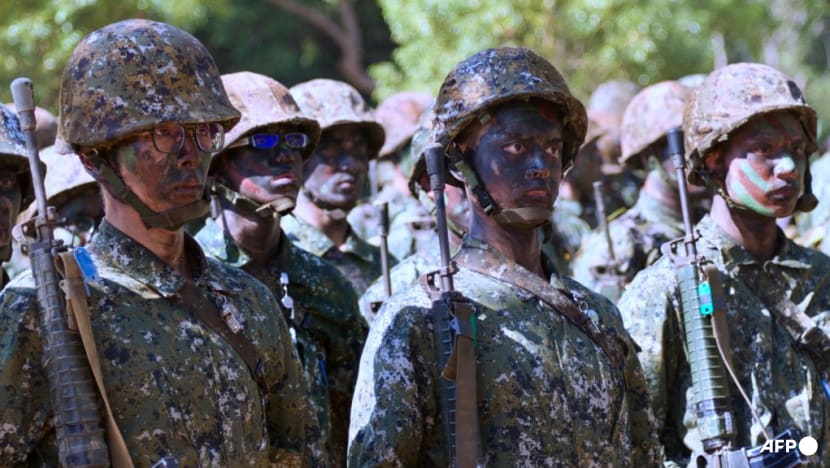
Taiwan compulsory servicemen demonstrate their combat skills at a military base in Taichung on Nov 23, 2023. (Photo: AFP/Sam Yeh)
This audio is AI-generated.
TAIPEI: When Taiwan’s next batch of conscripts enters the armed forces later this month, they will serve mandatory military service for one year – three times longer than the status quo.
The longer conscription period for all males born on or after Jan 1, 2005, is part of Taiwan’s “military force realignment plan” to strengthen national defence, which outgoing president Tsai Ing-wen announced in December 2022 amid rising cross-strait tensions.
All three candidates in Saturday’s (Jan 13) presidential election support extending military conscription even as they diverge on their approaches to China and other matters such as housing and the economy.
The rare consensus by the three men – Mr William Lai of the ruling Democratic Progressive Party (DPP), Mr Hou Yu-ih of the Kuomintang (KMT) and Dr Ko Wen-je of the Taiwan People’s Party (TPP) – reflects how the issue engages national security interests that rise above party politics, pointed out Dr Shen Ming-shih, acting deputy chief executive of the Institute of National Defense and Security Research (INDSR), a government-funded think-tank.
But even as there is also broad public support in Taiwan for longer conscription, reservations remain on the ground over the island’s self-defence capabilities. Former and future conscripts CNA spoke to have expressed concerns over the quality of training, while defence analysts have flagged troop morale as a pivotal factor.
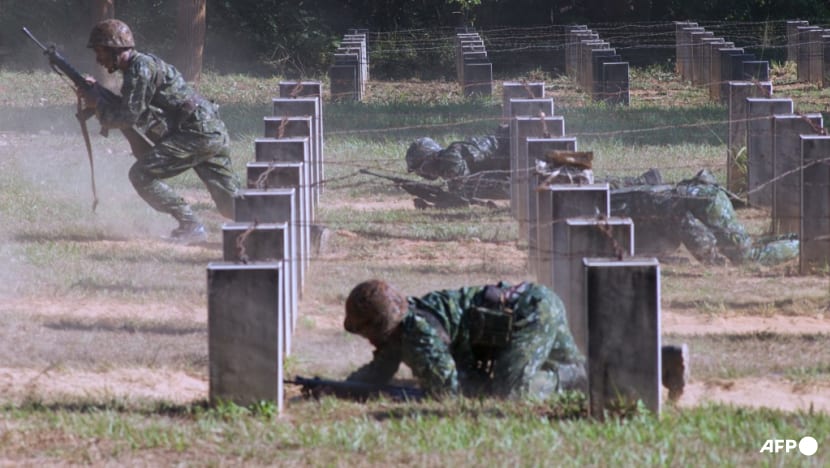
CHANGES FOR NEW RECRUITS
The conscription age in Taiwan is 18, but deferment is commonly granted for higher education. All males must serve in the military by the time they turn 36, the age at which they retire from the reserve forces.
Conscription length has varied under different administrations. It used to range between two and three years before being gradually reduced to one year by 2008. This was further cut to four months in 2013 under President Ma Ying-jeou of the KMT, who came to power in 2008 and pursued warmer ties with China.
The return to one-year service is part of a package of changes to conscription that also includes higher wages. The monthly salary for a private will go up to NT$26,307 (US$850) from NT$6,510.
There are also proposals with an eye to life after conscription, such as including the time spent in service when calculating future pensions, and “flexible” education to ease the transition into the workforce. A “three plus one” plan for male undergraduates to finish their studies in three years and spend the fourth year fulfilling military duties is on the cards.
The longer service period will allow Taiwan to create a standing garrison force mainly staffed by conscript soldiers, who will be responsible for territorial defence, said President Tsai when she announced the military force realignment plan in 2022. The garrison force will supplement Taiwan’s main battle force of 210,000, mostly comprising active-duty voluntary soldiers, who will fight at the frontlines.
President Tsai emphasised the link between strengthening national defence and preserving peace in the Taiwan Strait.
“Only by strengthening our self-defence capabilities can Taiwan more effectively protect our national security and interests while garnering further international support,” she said.
“The better prepared we are, the smaller the chance of adventurism from across the strait.”
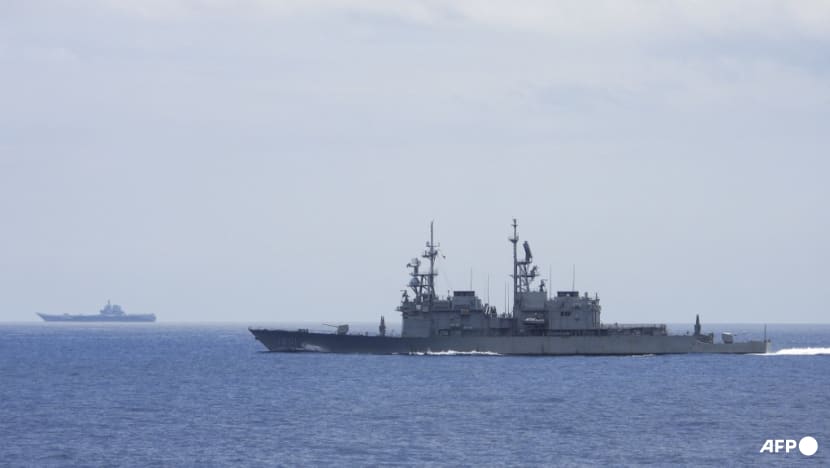
“THE POINT IS NOT THE LENGTH OF SERVICE BUT ITS CONTENT”
A survey by the Taiwanese Public Opinion Foundation in January 2023 found that 73 per cent of Taiwan’s people support extending conscription to one year. Close to 70 per cent held the view that four months of service is not enough in the face of China’s military threat.
Another survey published in April 2022 by the INDSR, a government-funded think-tank, found that 85 per cent of Taiwan’s people support the move. In the 18 to 29 age group, which includes some youths affected by the extension, support was lower at 75 per cent.
The INDSR survey also found that more than 45 per cent of people thought the military needed to improve training content and methods as a matter of priority, followed by about 38 per cent who thought weapons and equipment took precedence.
Male high school students told CNA they see military service as a duty they must complete, rather than an achievement they take pride in. Some questioned whether eight more months of service would make any contribution to national defence.
“I think everyone is patriotic enough to be willing to defend their own country. Whether the extension is meaningful or not is what I’m really concerned about,” said Li Hsin-yeh, 18, a student at Hua Jiang Senior High School in Taipei.
“If the training is just the same as before, we just pick weeds and do bayonet drills, I will be really against it,” he said, adding that to him, what matters is the effectiveness of the training and not the duration.
Fellow schoolmate Wu Heng, 17, shares similar thoughts. “The point is not the length of service but its content. I think the greatest obstacle of military service is whether the equipment is adequate,” he said.
One high school senior, 18-year-old Huang Cheng-te, did feel positively about longer conscription. “One year of service should be more useful than four months, at least I’ll be able to learn some actual skills,” he said.”
“They’re also raising our pay, so I hope to have some savings.”
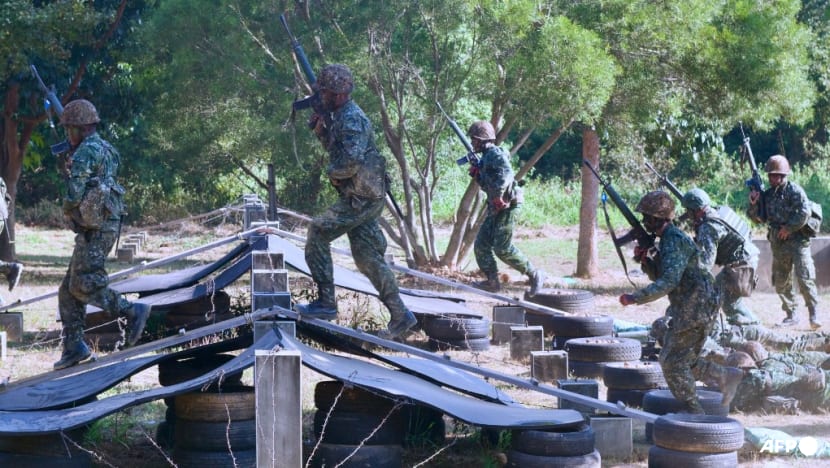
Former conscripts recalled being disappointed with their training and equipment. Mr Jack Huang, 30, completed his four months of service over two semester breaks in university. He felt his shooting practice was outdated, like a holdover from the 1950s, and did not see how it would help him in modern warfare.
“We spent the rest of the time sweeping the floor, cutting grass and other everyday tasks,” he added.
Former army regular Huang Kuan-chieh, 34, initially signed on because he was able to earn about 20 per cent more money than he would have as a fresh graduate in the private sector. He served in Kaohsiung for four-and-a-half years.
By the time he left in 2014, as a corporal, he felt that his officers were “behind the times” and not in touch with the needs of younger soldiers. Compounding the problem was lacklustre equipment for rank-and-file troops – from bulletproof vests, helmets and gas masks, to personal defence weapons.
When conscription is extended to one year, conscripts will spend more time in basic training – eight weeks, up from five weeks previously – before moving on to specialised roles in different branches of the military.
During basic training, bayonet drills will be replaced by close combat training. The use of modern weaponry such as missiles, rockets and drones will also be imparted. President Tsai has promised that recruits will fire 160 live rounds during boot camp, double the previous number.
While defence analysts say the upgraded training is expected to get conscripts more combat-ready and will particularly strengthen the reserve forces, they also acknowledge that the effectiveness of longer conscription is hard to assess as the changes have not been implemented yet.
Dr Su Tzu-yun, research fellow and director of INDSR, said Taiwan closely studied the training methods and conscription systems of the armed forces in Singapore, Sweden, Switzerland, Israel and the United States for its own reforms.
On whether the ongoing Russia-Ukraine war, which began in 2022, informed Taiwan’s decision to lengthen conscription, Dr Su said this was a short-term factor. The long-term consideration is Taiwan’s low birth rate, which in 2022 hit 0.87 – well below the replacement rate of 2.1.
Asked about the reservations expressed by the high school students, Dr Su said he was confident that the changes to basic training would address their concerns about spending their time in military service meaningfully.
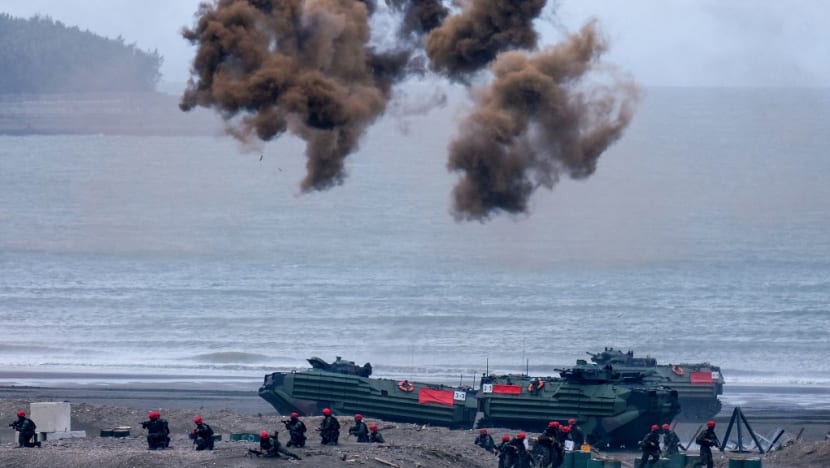
WORRIES ABOUT MORALE
At the same time, both Dr Su and Dr Shen cited psychological defence and troop morale as their top worry regarding Taiwan’s ability to defend itself.
According to another survey by INDSR, 68 per cent of Taiwan’s people are willing to fight if China invades. The poll was conducted in August 2022 – the same month that US House Speaker Nancy Pelosi visited Taiwan, triggering major military exercises by China around the island.
But controversies involving leaks and sabotage by people with privileged information about Taiwan’s military continue to make headlines.
Last week, two junior officers at an air force radar base were reported to have given China confidential information in exchange for money to pay off debts. And in October last year, the head of Taiwan’s indigenous submarine programme accused a legislator of sabotaging the construction of a submarine prototype by making it difficult to obtain parts.
Dr Shen said his biggest worry was the risk of Chinese intelligence or saboteurs infiltrating Taiwan’s military or buying informants, and the willingness of Taiwan’s people and soldiers to keep fighting in a situation of asymmetric warfare.
“Taiwan’s people and its military depend on each other for their ability to fight to the end. Without the people’s support, the troops will not be able to hold back the enemy. If the people don’t have the capability or the leadership of the military, they also won’t be able to fight back,” he said.
While troop morale is difficult to quantify, Dr Shen said it involves a sense of identification with the military, a sense of duty and honour to defend Taiwan and a sense of confidence in completing missions successfully. Better training and better equipment should raise morale, he said.
Dr Shen also pointed out that morale in Taiwan’s navy and air force is likely to be higher compared to the army, which is the largest branch of the island’s armed forces. That is due to them carrying out more missions in response to regular incursions by Chinese military aircraft and ships.
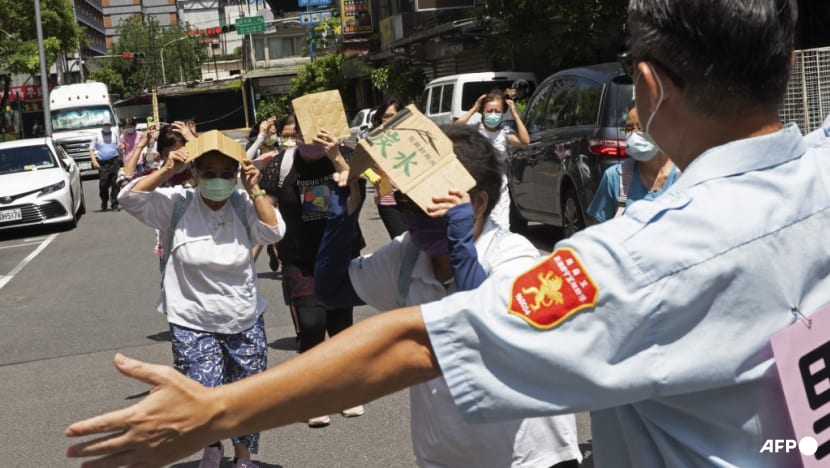
SELF-DEFENCE: DETERRENCE AND DIALOGUE
In a Wall Street Journal opinion piece on his defence plans last July, the DPP presidential candidate Mr Lai emphasised deterrence and said he would speed up Taiwan’s transition to an asymmetric fighting force. He is expected to continue President Tsai’s plans to bolster the military, including higher defence spending of 2.5 per cent of gross domestic product.
Both Mr Hou and Mr Ko have expressed support for raising Taiwan’s defence budget even higher, to 3 per cent.
Mr Hou has said he will pursue deterrence, dialogue and de-escalation in cross-strait relations. China is expected to resume dialogue with Taiwan if Mr Hou wins because the KMT accepts the so-called “1992 consensus”, which the DPP has refused to acknowledge.
The 1992 consensus is the understanding that both sides of the Taiwan Strait are part of one China, with each side having its own opinion as to what this means.
Dr Ko also wants to prioritise deterrence and communication in his approach to Beijing. He has said he will deal with the 1992 consensus “pragmatically”. Dr Shen said the former Taipei mayor does not seem to have a “central ideology”, and that it is harder to predict what a TPP administration would do.
When Chinese President Xi Jinping met his US counterpart Joe Biden last November, he denied American reports that he plans to invade Taiwan by 2027 or 2035. While both Dr Su and Dr Shen noted this exchange, they did not draw from it any definite conclusions on a unification timeline.
But Dr Shen believes that 70-year-old President Xi, who is not constrained by any term limits, is determined to unify the island with the mainland during his rule. China is pursuing both “peaceful” and forceful unification simultaneously as they are complementary – military might can be used to threaten Taiwan if it resists non-military means, he said.
“Peaceful” unification involves tactics like bribery, dividing Taiwan’s domestic unity, cultivating proxies, and ensuring a pro-China regime is in power, while forceful unification involves building up China’s capacity to meet US firepower, said Dr Shen.
He described three ways China could use force to achieve its objectives in Taiwan. First, the People’s Liberation Army (PLA) could intimidate Taiwan into accepting its terms for unification, such as “one country, two systems”, by launching missiles near the territory or occupying outer islands like Kinmen and Matsu.
Second, the PLA could impose a blockade by blocking maritime routes. Third, it could launch an invasion such as by establishing a beachhead in the Penghu islands. Invasion is the riskiest scenario for China and the PLA would suffer losses in its first wave of attacks, said Dr Shen, citing the high density of missiles on Taiwan and reserve forces that he described as 2 million to 3 million strong.
On how Taiwan can respond to this, Dr Shen said its priority was not to give China any excuse to wage war, as this would also hurt the chances of foreign military intervention on the island’s behalf. Taiwan must also build up its self-defence capability in order to have a bargaining chip in any talks with China.
“If there’s an understanding about this, then no matter which party is elected, there should be a consensus on strengthening the defence forces and putting in a large amount of resources to do so,” he said.
For Taiwan’s young men expected to defend their homeland, however, the simmering conflict and strategic considerations can seem very far removed from their own lives.
High school student Wang Bo-hsuan, 16, said he simply felt unlucky that his parents had him after 2005, and that he will have to serve one year of conscription.
“It makes me question why I was born so late.”








